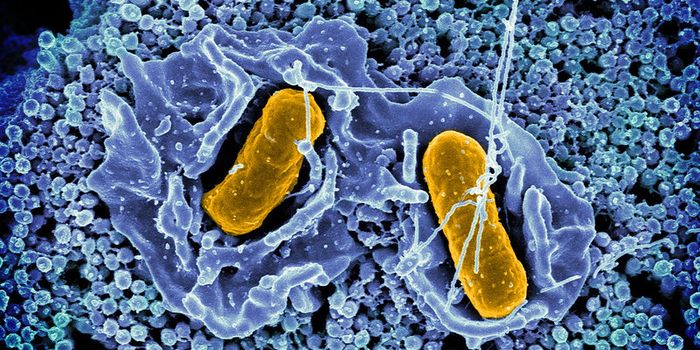Zika Virus Used to Treat Advanced Tumors in Dogs
Researchers in Brazil have found a use for the zika virus; they successfully treated advanced tumors of the central nervous system of three elderly dogs with injections of the virus. The findings have been reported in Molecular Therapy.
"We observed a surprising reversal of the clinical symptoms of the disease, as well as tumor reduction and longer survival with quality, which matters most. Moreover, the treatment was well-tolerated and there were no adverse side-effects. We're genuinely excited by the results," said Mayana Zatz, a professor at the University of São Paulo's (USP) Institute of Biosciences (IB) and the principal investigator of the Human Genome and Stem Cell Research Center (HUG-CELL).
The researchers that performed this study have already shown that zika virus can destroy tumors of the central nervous system in a mouse model that requires immunosuppression. In this new work, animals with a functioning immune system were used.
"The findings confirm that the therapy acts via two mechanisms. On one hand, the virus infects tumor cells, starts to replicate in them, and eventually kills them. On the other, it alerts the immune system to the presence of the tumor. The infection triggers an inflammatory reaction, and defense cells migrate to the site," said the first author of the study Carolini Kaid, who has a postdoctoral scholarship from FAPESP.
Immunotherapy is often not useful in treating central nervous system tumors, Kaidens noted, because it cannot get across the blood-brain barrier.
In this new study, a strain of the virus that had been isolated from a patient was injected into the dogs' spine below the skull. A postmortem analysis of the subject's brains indicated that immune system cells including macrophages, monocytes, and T lymphocytes had reached the tumor.
"The analysis also showed that zika was present only at the edges of the tumor. No other brain cells were affected. This is a most important finding, enhancing our confidence that the treatment is safe," Kaid said.
The dogs in the study were patients of veterinarian Raquel Azevedo dos Santos Madi in Sao Paulo. They were diagnosed by MRI when symptoms began. Typically, dogs with this diagnosis would live for 20 to 30 days.
A 13-year-old pitbull got the first treatment. "He came to us in a pre-coma. He was unable to stand up and his only source of nutrients was an IV drip. Three days after the injection, he was able to eat again, stand up and even take a few steps. He survived for 14 days but was already very weak and suffered a cardiac arrest. His owners had to put him down," Zatz said.
Eight-year-old boxer Matheus survived for 150 days after receiving their treatment and experienced a 35.5 percent reduction in the mass of their tumor. Nina, a twelve-year-old Dachsund, lived another 80 days after treatment, and her tumor was reduced by 37.92 percent.
"In contrast with the effects of chemotherapy, the animals displayed no negative reactions to the treatment. We began with a small dose, which was well tolerated, so we injected a second dose that was ten times larger," Zatz said.
This work may be useful for patients with various kinds of tumors that impact the central nervous systems of children and people over age 60, according to IB-USP professor and HUG-CELL member Oswaldo Keith Okamoto. "These two groups tend to suffer more often than not from aggressive types of tumor, for which there are no effective treatments at present," he said.
The scientists also analyzed how the virus interacted with healthy cells in the brain that give rise to new cells, called neural progenitor cells.
"When we infect the neural progenitor cells, zika interrupts their proliferation, and some of them die. But the spheres [made by progenitor cells clustering in 3D culture] remain relatively intact. In the case of tumor stem cells, the destruction is far more prominent. Our in vitro tests also showed that the virus doesn't infect mature nerve cells such as neurons. That's a very positive finding," Kaid said.
"We learned a great deal from the study with these three dogs, and we now plan to begin a new preclinical trial with a larger number of animals. One of our aims is to discover the ideal dose of the virus for the treatment. If it works, it will offer hope that both dogs and humans can be given the treatment, but we'll need more funding and we're looking for partners," Zatz said.
Sources: AAAS/Eurekalert! via Fundação de Amparo à Pesquisa do Estado de São Paulo, Molecular Therapy
![Imunofluorescence image of brain tumor tissue from a dachshund dog after intrathecal injections of Zika virus. The presence of the virus [red] infecting tumor cells [blue] with intense necrosis is observed at the edges of the tumor./ Credit: Carolini Kaid, CEGH-CEL](https://d3bkbkx82g74b8.cloudfront.net/eyJidWNrZXQiOiJsYWJyb290cy1hc3NldHMiLCJrZXkiOiJfcHVibGljXC9fZmlsZXNcL3N5c3RlbVwvY2tcL3RyZW5kaW5nXC9TY3JlZW4gU2hvdCAyMDIwLTAzLTEyIGF0IDkuMjMuMzcgUE1fMzNiNDcyMzcxODFkMDhlNjIzNzI3NDViMjQ3MGEwZmYucG5nIiwiZWRpdHMiOnsicmVzaXplIjp7IndpZHRoIjoxNDAwLCJmaXQiOiJjb3ZlciJ9fX0=)








